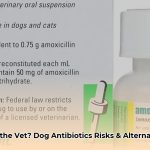If your dog’s gums are white instead of their normal pink, this is a veterinary emergency. White gums indicate a serious problem with your dog’s circulation and require immediate action. This guide will explain how to check your dog’s gums, potential causes of this alarming symptom, and what steps to take if you discover this issue.
How to Check Your Dog’s Gums
Checking your dog’s gum color is a simple yet life-saving skill. Here’s how:
- Gently lift your dog’s upper lip. Avoid startling them.
- Examine the gums just above the canine teeth. This area provides the best indication of gum color.
- Compare the color to the inside of your lower eyelid. Healthy gums are a similar pink. Are your dog’s gums pale pink, white, gray, or bluish?
- Perform the capillary refill test (CRT). Press your finger gently on the gums and release. The color should return to normal within one to two seconds. Delayed refill time (longer than two seconds) suggests a circulation problem.
(Insert image here comparing healthy pink gums to pale/white gums)
Why Are White Gums So Serious?
White gums indicate a disruption of blood flow, meaning oxygen isn’t reaching your dog’s vital organs and tissues. This can be caused by a range of issues, from anemia to life-threatening conditions like shock.
Possible Causes of White Gums
The following table outlines some potential causes of white gums in dogs:
| Potential Cause | Associated Symptoms | Urgency Level |
|---|---|---|
| Anemia | Lethargy, weakness, rapid breathing | High |
| Internal/External Bleeding | Weakness, pale gums, collapse, cool extremities | EMERGENCY |
| Shock | Rapid heart rate, weak pulse, collapse, cool extremities | EMERGENCY |
| Toxins (e.g., rat poison) | Vomiting, diarrhea, seizures, difficulty breathing | EMERGENCY |
| Heart Disease | Coughing, difficulty breathing, exercise intolerance | High |
| Bloat (GDV) | Swollen abdomen, retching, restlessness | EMERGENCY |
| Kidney Disease | Increased thirst, increased urination, loss of appetite | High |
| Dehydration | Dry mouth, lethargy, sunken eyes | Moderate |
Some research suggests a link between certain breeds and a higher risk of conditions like bloat, which can manifest as white gums. Larger, deep-chested breeds are thought to be more susceptible. Further research is exploring the role of genetics in anemia and other circulatory problems.
What to Do if Your Dog Has White Gums
If your dog has white gums, consider it a medical emergency.
- Immediately contact your veterinarian or an emergency animal hospital. Every second counts.
- Provide the following information:
- When you first noticed the white gums
- Any other symptoms your dog is exhibiting
- Your dog’s breed, age, and medical history
- Any medications your dog is currently taking
- Transport your dog to the veterinary clinic immediately and safely. If your dog is unstable, prioritize stabilizing them for transport (e.g., covering wounds, keeping them warm).
Preventing White Gums in Dogs
While not all causes of white gums are preventable, some proactive measures can help reduce the risk:
- Regular Veterinary Checkups: Early detection is key.
- Parasite Prevention: Parasites can cause anemia.
- Balanced Diet: Proper nutrition supports a healthy immune system.
- Avoid Toxins: Secure household chemicals and medications.
- Monitor Gum Color Regularly: Become familiar with your dog’s normal gum color.
Frequently Asked Questions
- Q: Are pale gums always an emergency? A: While slight variations in pinkness can occur normally, true white gums are always a cause for concern and warrant immediate veterinary attention.
- Q: Could stress cause pale gums? A: While stress might cause a slight paling, true white gums point to a more serious underlying issue.
- Q: What tests might the vet run? A: Depending on the suspected cause, tests may include blood work, urinalysis, X-rays, and/or ultrasounds.
Important Considerations
It’s crucial to remember that current veterinary knowledge is always evolving. While we understand much about the causes and treatments of white gums, ongoing research continues to shed light on this serious condition. This article provides general information and should not be substituted for professional veterinary advice. Always consult with your veterinarian for diagnosis and treatment. Do not attempt to treat this condition at home; prompt veterinary care is essential.
Disclaimer: This article is for informational purposes only and does not constitute veterinary advice. Always consult with a qualified veterinarian for diagnosis and treatment of any health condition.
- Top Rated Books on Mindfulness to Find Your Calm - February 6, 2026
- Top Rated Meditation Books to Deepen Your Practice - February 5, 2026
- Good Mindfulness Books For A Calmer, Happier Everyday Life - February 4, 2026
















